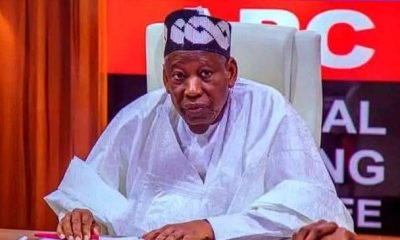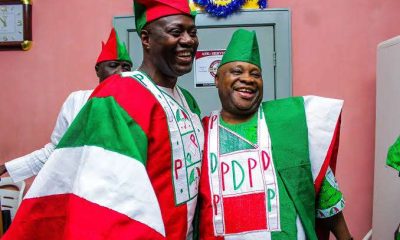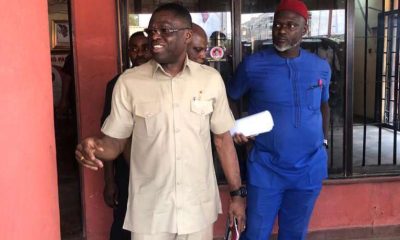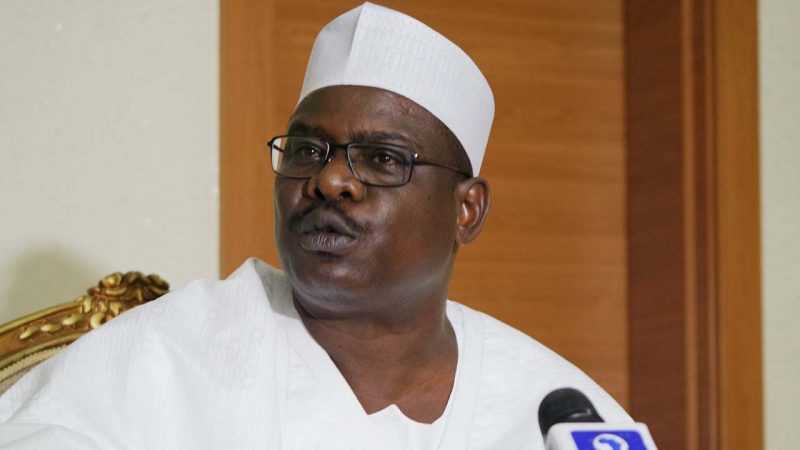Headlines
9th NASS: Battle for control in feverish tension

By OLUSESAN LAOYE
With the inauguration of President Muhammadu Buhari for a second term this week, attention will turn to the leadership contest of the legislature. Already the political atmosphere has been charged as the different interests in the two main political parties battle each other for supremacy. The APC is anxious to avoid a repeat of what happened in 2015 during the election of the leadership of the 8th NASS.
Since the past two months after the general election there had been serious horse trading as to who would dictate the tune in both ruling All Progressive Party (APC) on one hand and the camp of the Peoples Democratic Party(PDP) on the other.
While the APC camp is now strongly divided, the PDP camp is equally determined to change the existing procedure to give room for a stiff competition among the members
The APC had reportedly shot itself I the foot when its chairman, Adams Oshiomhole, declared in their meeting after the election that the party has the numbers to determined the leadership of both chambers of the NASS without input of the PDP and boasted that the main opposition would not benefit in any way from the new arrangement. However, recent developments show that this position had emboldened some dissident APC members to collaborate with the PDP like Saraki did, to push their candidature.
Members are also insisting that the party should interfere in the process as it is a strictly an internal National Assembly and they should be allowed to elect their own leaders. Section 50 of the constitution stipulates how the senate President and Deputy could be elected, and section 92(1) for the speaker of the House of Representatives and his Deputy. The battle is still raging and no one is sure of how it would be resolved as cracks are developing on daily basis and strongly too within the APC.
What is also trending and of major concern is the voting pattern to be used for the election in the 9th Senate. Some of them are clamouring for the 1999 method of open ballot system which was in use before the 8th Senate of Bukola Saraki, who changed it to the secret ballot system.
While the camp of Senate leader, Ahmed Lawan (Yobe) who is favoured by the Presidency and the leadership of the party led by Ahmmed Bola Tinubu wants the open ballot, other groups within the party backing Ali Ndume (Borno) and Dajuma Goje (Gombe) are settling for the new method of 2015 secret ballot which was used to elect the officers in both the senate and the House of Representatives.
In 2015 Senate standing order stipulated that secret ballot as the sole method in electing the two presiding officers of the president and the Deputy. This eventually brought controversy and the order was challenged in court on the allegation that it was smuggled into the rules because there was no time the 7th senate amended the rules to secret ballot system.
The Lawan group are insisting that the 2011 order should be in force and not 2015 which others are yearning for, saying, “that is the latest which should be used for the 9th Senate inauguration in June”.
One of the contenders for the Deputy Senate president, Senator Kabiru Gaya (Kano South) wants 2015 rules as the only one which has not been changed. But Senator Ahmed Babba Kaita (Katsina North) kicked against it. The situation now is that the senators would slug it out with themselves when they resume in June to elect new officers.
What is also heightening tension according to one of the senators in contention is the involvement of the EFCC in respect of the controversial 2015 rules. It was alleged by the group opposed to Lawan that his group was instrumental to the involvement of the EFCC in the matter to suppress other groups alleging that it was part of the presidency’s tactics to subdue them but they would not be deterred and are determined to fight against imposition of their leaders.
While reacting to the allegation that the Lawan group was behind the harassment of the opposition, Senator Aliyu Sabi Abdullahi, from Niger State denied that their group was responsible for bringing the EFCC but they are only busy working for how Lawan would emerged as the Senate President.
Also the National Assembly issue has led to open confrontations between the top National officers of the two big parties the APC and the PDP. In the past few days there had been war of words going on.
The National publicity of the PDP Kola Ologbondiyan said the leadership of the the NASS is not the exclusive right of APC, saying that the Assembly belongs to no political party but all. He argued that sections 50 and 92:1 stipulate that leadership shall be by members of the two legislative chambers.
The PDP said they would field candidate for the Senate President, and he referred to the period when Aminu Tabbwal defected from PDP to APC in 2014 without relinquishing the speakership. He said that House leader Gbajabiamila that time too said that it was the duty of the members to elect their officers. He then wondered why the APC is now complaining.
However, the National Publicity Secretary of the APC, Lanre Isa- Onilu pointed out that PDP has no right to dabble into who leads the National Assembly, as it is the exclusive right of the ruling party.
Meanwhile, Senator Ndume had attacked the National Chairman of the APC Adams Oshiomhole of meddling into the affairs of the Assembly. He said the Assemblymen have the right to appoint whom they deem fit to lead them.
In their own reactions, the minority leader, Senator Biodun Olujimi and her counterpart, Senator Dino Melaye warned the APC not to bring Saraki into the issue as the 9th Senate would determine its leadership. “They should leave Saraki alone of their scheming because members when they convene would elect appropriate leaders to lead them.













